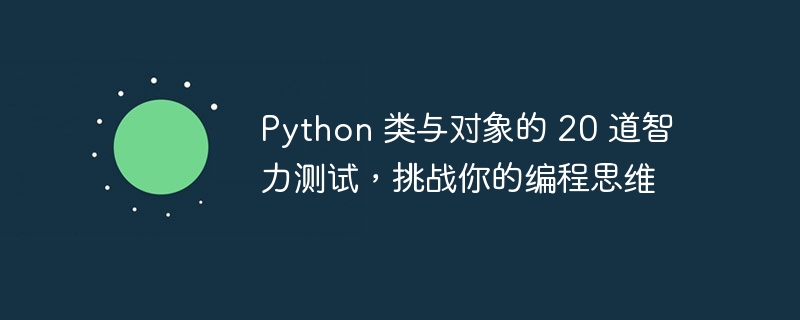Home >Backend Development >Python Tutorial >20 intelligence tests on Python classes and objects to challenge your programming thinking
20 intelligence tests on Python classes and objects to challenge your programming thinking
- WBOYWBOYWBOYWBOYWBOYWBOYWBOYWBOYWBOYWBOYWBOYWBOYWBforward
- 2024-03-15 09:04:151038browse

- What is the difference between a class and an object?
- How to create a class?
- How to create an object?
- How to access the properties and methods of a class?
- How to call a method through an object?
- Explain the self parameter.
- What is the difference between class and instance variables?
- What is inheritance?
- What is polymorphism?
- What is encapsulation?
- What is a constructor?
- What is a destructor?
- What are special methods (magic methods)?
- What are class methods and static methods?
- What is a property decorator?
- What is method overriding?
- What is duck typing?
- Explanation of multiple inheritance in python.
- What is an abstract class?
- Explanation Class variables in Python.
Answer:
1. The difference between classes and objects
- Classes are templates, and objects are instances created using the template.
- Class defines properties and methods, and objects contain specific property values and method instances.
2. How to create a class
class MyClass: # 类属性和方法
3. How to create an object
obj = MyClass()
4. How to access the properties and methods of a class
- Attribute: object name.property name
- Method: Object name.Method name()
5. How to call methods through objects
obj.method()
6. Explain the self parameter
- The self parameter represents the caller object of the method.
- It allows methods to access and modify the properties and methods of the object.
7. The difference between class and instance variables
- Class variables are stored in the class and shared by all objects.
- Instance variables are stored in objects, and each object has its own value.
8. What is inheritance
- Inheritance allows one class (subclass) to inherit properties and methods from another class (parent class).
9. What is polymorphism
- Polymorphism allows different objects to perform different behaviors in the same method.
10. What is encapsulation
- Encapsulation bundles the data (properties) and operations (methods) of the class together.
- It restricts external access and modification of internal state.
11. What is a constructor
- The constructor is a special method that is automatically called when creating an object.
- It initializes the properties of the object.
12. What is a destructor
- The destructor is a special method that is automatically called when the object is destroyed.
- It releases resources or performs cleanup operations.
13. What is a special method (magic method)
- Special methods have double underscores (__) as prefix and suffix.
- They allow classes to define specific behaviors, such as addition (add) or comparison (eq).
14. What are class methods and static methods
- Class methods interact with the class itself without requiring an object instance.
- Static methods do not interact with classes or objects, just like ordinary functions.
15. What is a property decorator
- Property decorators are functions used to modify or extend the behavior of properties.
- For example, the @property decorator converts methods into properties.
16. What is method overriding
- Method overriding allows subclasses to redefine parent class methods.
17. What is duck typing
- Duck typing compares based on the object's behavior (method implementation) rather than its type.
18. Multiple inheritance explained in Python
- Multiple inheritance allows subclasses to inherit properties and methods from multiple parent classes.
- It can lead to diamond inheritance problems, but can be solved by using depth-first or breadth-first search algorithms .
19. What is an abstract class
- Abstract classes contain abstract methods that cannot be instantiated.
- It is used to define the interface that subclasses must implement.
20. Explain class variables in Python
- Class variables are stored directly in the class and are shared by all objects.
- They can be accessed with Parent.variable_name.
The above is the detailed content of 20 intelligence tests on Python classes and objects to challenge your programming thinking. For more information, please follow other related articles on the PHP Chinese website!

